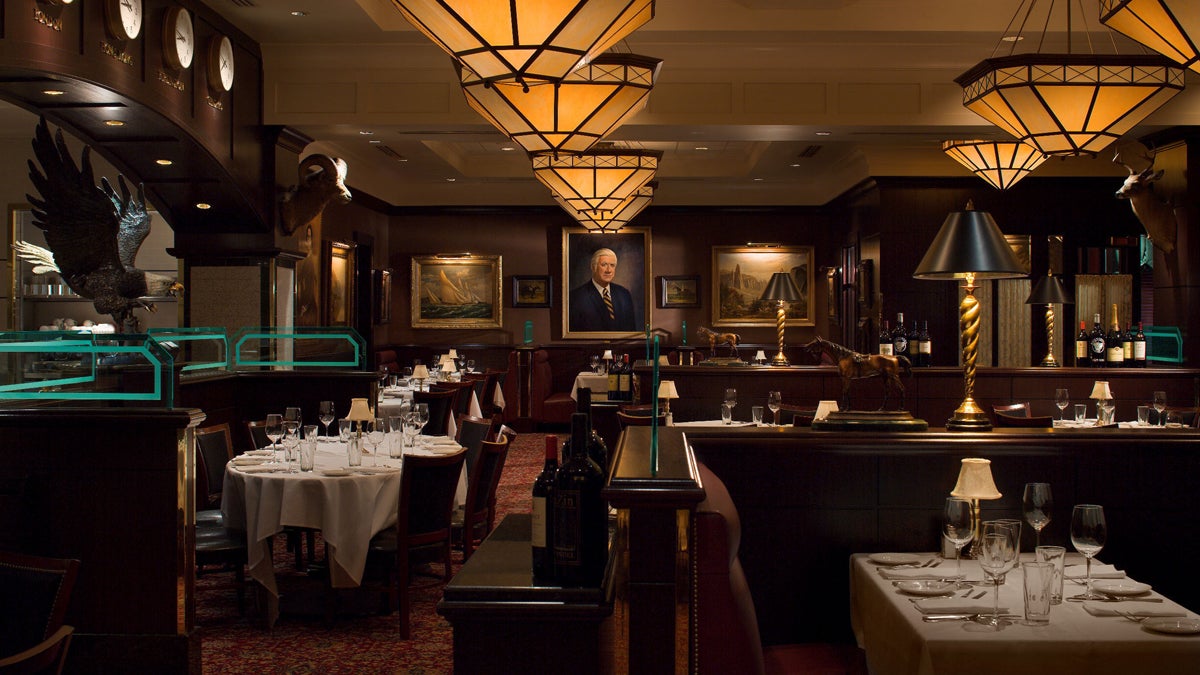Dementia, robbing us of our parents, our parents of themselves

The Capital Grille dining room. (PRNewsFoto/The Capital Grille, Warren Jagger Photography)
Celebrations have always been a little complicated with my husband’s family. But since both of his parents were diagnosed with dementia, family occasions have become even more unpredictable.
As we pulled up to the restaurant, I already knew it was a mistake. I had suggested, several times, going to a neighborhood eatery instead, but my father-in-law insisted that we go to the Capital Grille, a large, dark and very overpriced steak house in the suburbs. His wife, my mother-in-law, adored a good filet mignon, and for her 87th birthday, she should have the best.
None of this should have been a problem—had not both of them been diagnosed with dementia in the past six months.
Celebrations have always been a little complicated with my husband’s family. One factor is his sister, diagnosed with schizophrenia during her freshman year of college. But since the double diagnosis of his parents, family occasions have become even more unpredictable.
My mother-in-law’s transformation wasn’t particularly gradual. An antiques dealer who played regular games of bridge and who listened to concertos and symphonies of the Philadelphia Orchestra with the tenacity of a hawk at prey, she was suddenly unable to recognize her youngest son at Thanksgiving. She couldn’t find the bathroom in my house at Christmas.
Little clues, which gradually led to a diagnosis.
“Something’s wrong,” she said with real poignancy, “but I don’t know exactly what it is.”
My husband and I knew. But as we tried to absorb the news about this vivacious, know-it-all woman, who never met a situation that she did not try to control, the second shoe dropped: My dear father-in-law, an electrical engineer and a gifted painter and photographer, had dementia as well.
It was and was not a surprise. There had been a series of forgetful questions (“Where did you get this bread?” followed by “It’s good, this bread. Where did it come from?”), overlong pauses between thoughts and an inability to organize his once precisely organized office, lost in an uncharacteristic blur of papers and files.
Unlike my mother-in-law, who seemed on the surface to simply push her disability into the denial column, my father-in-law was angry—at the doctor, at the situation, at life.
None of this is new. Dementia, according to my 92-year-old mother, who lives in a housing facility with other older residents, is a fact of life: people ordering dishes that they never remember eating; people suddenly angry for no reason. And yet.
“It will be a few minutes,” the maître’d told us at the entrance to the restaurant. My father-in-law is slightly hard of hearing, so he plowed straight ahead, my mother-in-law on a walker on his arm.
I watched them, and then my husband following to bring them back.
My husband has been having the hardest time of all, understandably: They are his parents. Dementia is a disease that robs you of the ability to be who you are and leaves you with a vague imprint of who you were. Everything is the same, yet nothing is the same. Despite the loss, at this early stage of the disease, independence and willfulness and forceful evidence of personality remain, even as the mind loosens its hold on such bits of information as what year it is and the name of the current president.
The night went as badly as I anticipated. My mother-in-law vanished into the bathroom for long stretches. We took turns at the ladies’ room door to prevent her from wandering off. My sister-in-law mused over ordering a lobster (unthinkably expensive) and takeout off the menu, while my father-in-law broke a wine glass and took an instant dislike to our waiter.
“I hate this waiter,” he confided to me. “He’s terrible at his job.”
“Why, Dad?”
“Because he won’t take my order,” he said.
“He just took it.”
“Did he?”
He sat back, confused but pacified for five minutes, when it all started again. “This is a terrible waiter,” he said. “When is he going to get our order?”
Around us, oblivious couples celebrated birthdays, anniversaries, promotions. Our table was strewn with rose petals and sparkles for my mother-in-law’s birthday. When she finally emerged from the ladies room to eat her steak, I thought how, in an earlier incarnation, these decorative touches might have pleased her. Now, I watched across the table as she fingered a rose petal, uncertain what it was.
My sister-in-law badgered the waiter for the absence of bread pudding from the menu and then finally ordered a piece of cheesecake to go. Waiters arrived with a slice of chocolate cake sparked with a burning candle and “Happy Birthday” was sung.
From across the table, I watched my mother-in-law examine one of the rose petals, sliding the velvety surface between her fingers. I remembered how sharp she had been: an accomplished violinist, a knowledgeable specialist in Chinese import and modern art. I looked at my father-in-law, his jaw slightly slack. I thought of his vast knowledge of science and wine.
I leaned toward my mother-in-law. “It’s a rose petal, Mom. It’s for you.”
She looked up at me with half a smile.
Who? she seemed to inquire.
—
Ilene Raymond Rush is a freelance writer whose work has appeared in a wide variety of national publications. She is a regular blogger for A Sweet Life and dLife.
WHYY is your source for fact-based, in-depth journalism and information. As a nonprofit organization, we rely on financial support from readers like you. Please give today.

